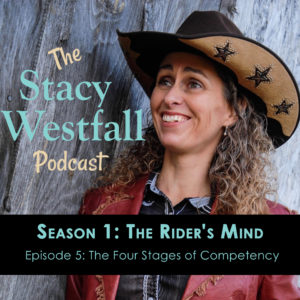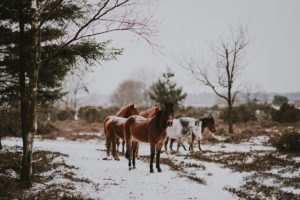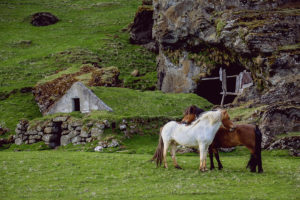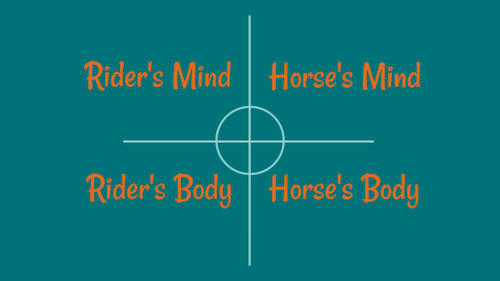Episode 5: The Four Stages of Competency

There are four stages of competency when riding your horse. I first read about these on an article in Dressage Today. The first stage is unconscious incompetence. The second stage is conscious incompetence. The third stage is conscious competence. The fourth stage is unconscious competence.
I talk about what these stages mean to riders and the stage that people often get stuck in. I also talk about how there is no shame in having to relearn habits, and I share a passage from a readers email and talk about getting the right teacher.
“As a teacher, it's fun to be around people new to riding, because they have have a lot of excitement, energy, and creativity.” -Stacy Westfall Click To Tweet
Subscribe and never miss an episode! (I listen in the barn and when I’m out driving)
Subscribe Free
Need help subscribing? Here are two video links that will walk you through subscribing to a podcast. I didn’t make the videos so be sure to search for Stacy Westfall after you download your podcast player!
How to Subscribe to a Podcast on an iPhone: https://youtu.be/9SD8z3VJua4
How to Subscribe to a Podcast Using Stitcher App for Android:https://youtu.be/FKxnFAmNEtE
Show Notes
[01:09] I found an article on Dressage Today about the four stages of competence.
[01:21] The first one is unconscious incompetence or you don’t know what you don’t know.
[01:29] The second stage is conscious incompetence. This is the stage for you become aware of things you don’t know.
[01:37] The third stage is conscious competence. This is where if you focus and try hard you can be confident and able to perform whatever you are trying to do.
[01:53] The fourth stage is unconscious competence. This is where you have to work less, because things are happening at an unconscious level.

[02:05] A good example of these stages is when you are teaching someone how to drive.
[03:03] When applied to riding unconscious incompetence is kind of that dreaming stage.
[03:33] Even though riders in the dreaming stage don’t have a lot of knowledge, they have a lot of excitement.
[04:03] If someone falls off a horse for the first time in the unconscious incompetence stage, they quickly realize that something can happen.
[04:57] Once you enter conscious incompetence, you can start learning and becoming more aware.
[05:18] An example of this is you’ve been dreaming of getting a horse, you get a horse, the horse is getting pushy, and you start looking for more help.
[06:00] The conscious competence comes around when you’re focused and thinking about what you are doing.
[06:33] Unconsciously competent looks kind of magical to people, but it just comes from hard work and good practice.
[07:14] It’s important to recognize that these stages exist.
[07:35] People often feel stuck right in the middle when they are working between conscious competence and conscious incompetence.
[08:17] If you study and put in the time, you can get to the unconscious competence stage.
[09:33] A lead change is an example where a high degree of awareness is needed for a long time.

[12:06] My muscle memory is unconsciously competent for a certain set of things that I’ve trained my body to do. I had to be conscious of my right hand when taking dressage lessons because it was on autopilot.
[15:42] When switching disciplines there’s a challenge that comes along with it.
[16:09] When you have to break old habits don’t start condemning yourself. Don’t start beating yourself up mentally, because it’s not needed. It’s not helpful. It will hold you back instead of moving you forward.
[16:57] An email from a reader who is going to take up riding. She needs to find a riding instructor that is the right fit for her so she can be open.
“The difference between unconsciously incompetent and consciously incompetent is usually a turning point that involves some kind of minor or major injury.” -Stacy Westfall Click To TweetLinks and Resources:
How to Embrace “Incompetence” in Dressage
Learning Strategies for the Dressage Rider
- Blog post on Stacy wrote about the 4 Square model: Quickly Evaluating Problems with Horses and Riders

Subscribe Free
80 Comments
Leave a Comment
SUBSCRIBE TO THE PODCAST HERE:





YOURS FREE
WHY IS MY HORSE...?





This is great food for thought. Slowing training down, especially in ground work, helps me to work with my colts more efficiently. This takes conscious competency!
Thank you, Stacy. I am an admirer of yours.
Yes! I’ve always said that once you know something (starting colts for example) it takes self-control to slow it down to the pace the horse needs. You’re exactly right-conscious competency!
This is something I learned from Jesse’s training class, I am still working towards the final stage in my training journey with my personal horse. I still tend to beat myself up since I often want to be perfect, but like you said, it won’t help me at all in moving forward. So I’m working on just being in the process.
Thank you for these podcasts! They served as great reminders for me and what I ought to think about.
-Bekah
I’m loving all your podcasts.Lately with my horse we’ve been working between the conscious competent stage and the unconscious incompetence stage…where I’m feeling stuck but I’m ready to be learning/teaching, and I feel like I’m not getting anywhere.The podcasts have helped me out a bit, and given me hope that if we keep working at it and I keep an open mind, rewarding every little thing,that it’ll get results.And things will get accomplished!i’m feeling inspired and ready to give it another go:)thanks so much!wishing you a merry Christmas and New Years!??
I understand compency and many things I do are unconscious. I have to be in a horse to remember what my baby does in certain situations. That makes teaching a challenge…I will pretend I am on the horse and stand in that picture to know how to tell the student what to do with their body. Explaining something so it is easily understand if where I am already looking to improve. I hope by ready your books that will help me plus make me more conscious of where I am in my abilities. I have a couple of your DVD’S and your halters. Would love to have more tools to improve myself and horses.
Awesome information to listen to. I am a good leader but sometimes I get impatient for the result I want. Realizing you need to become better at leading makes it come easier and quicker. Enjoying adding to my arsenal of knowledge.
I would have to say Im all four stages at one point or another… that’s a scary thought. I am conscious competent in mornings though when I walk and trot with multitasking of coffee in one hand, and sometimes phone too. That’s me for ya! Other times I do the other three a lot. Ive learned enough to not do a certain thing or two, other times I’m not aware I’m doing it. Or I am learning how to do something correctly but it will take me months to do it correctly.. lots of conscious frustration with my cerebral palsy and wanting to be perfect, ha!
I’ve heard Jesse talk about the Four levels of competency and I just love them.
All these podcasts are applicable outside of horses all.
I love the podcasts! I am obsessed with horses, and could ride or just hang out with them all day. I’ve got three young kids and my husband is not an animal person so its a bit of a challenge to balance my time. I think I’ve felt “stuck” for a majority of the years I’ve owned a horse and am constantly on the lookout for tips and suggestions. I’ve owned three horses, the first a baby, big mistake, but a big learning experience. The second was a green broke gelding, and the third a slightly better trained mare. I thought that the horses were the problem but I kept coming back to the same issues. Recently I came to the conclusion that I just don’t know enough and am not a good enough rider, and considered selling my horse. However the comments you made, got me to realize there are different levels of skill and knowledge and no one knows everything. I’ve made a new commitment to be consistent in spending time with my horse even if its not a big block of time each day. Thank you for your insights and being willing to share them!
Hardest pod cast to comment on
Which stage am I
I don’t know
Maybe a mix all in one day?
I’ve never heard of the four stages of competency before now. It’s easy to apply this to many different things as you were saying with your example of learning to drive. I like that you talk about being unconsciously competent in one thing and simultaneously being consciously incompetent in another. Everyone can be really good at somethings and struggle with others and that is okay. I’m really bad about beating myself up when I’m trying to learn a new thing and it doesn’t come naturally. It’s important for me to recognize these stages and know that it’s all part of the learning process. Thank you for more “brain food”!!!
Thank you for sharing such a great concept of learning applied to horsemanship- particularly the discussion of being both competent and incompetent in a maneuver like the flying lead change – I look forward to more of your podcasts
Stacy thank you for sharing this topic and breaking down the four stages of competency. This is something that we can apply not only to riding and working with horses but in other life experiences. I have found this so helpful not only as a rider but as a riding instructor. I feel that being aware of the four stages of competency will allow me to better teach my students to help them be successful. It also is so important for me to be aware of what stage of competency I am in regards to particular skills so that way I can teach what I am comeptent in and learn what I do not know. I feel that because of all of the different things that go into different disciplines and that one thing may work for one horse and not the other it is critical to be aware of the four stages of competency in order to increase ones skills and knowledge to work towards unconscious competency. I Know for me that as I learn more and gain experience I move towards being deeper in the unconsious competency stage in certain areas but I also know that in other areas I fall into conscious incompetency and the only way to fill that gap is to put in the time and hard work to learn and grow. This podcast has been very helpful to help me understand the four stages of competency and that I can use this new knowledge to better help myself and my students. Thanks for sharing!
Terrific final podcast in the series of the Riders Mind. The four stages of learning, I really liked the bell shape analogy. I believe the four stages are cyclic with the unconscious incompetence being the shortest stage at every level of learning when we have achieved the unconsciously competent. I certainly know what it feels like to be stuck in the conscious incompetence and am at that very level now in my journey. However having said that I have had moments of the conscious competence and it felt really good and I’m hoping to build on those moments by remembering how I asked my horse to do something until it becomes a muscle memory and eventually leads to unconsciously competent. My Instructor is definitely at the unconsciously competent stage and we have a laugh with this when I’m having a lesson with my horse because she will sometimes say ‘Now how do I do that, just let me take him for a minute so I can show you’, this happens because when she works with a horse what she does is second nature, like driving the car, she does things without thinking about it, just knows what to do (unconsciously competent). The great thing for me is that my Instructor understands the levels of learning, she understands that I have fears and lack confidence, her support and help is priceless and I hope that all of you out there find that caring Instructor who has been through it all themselves and understands where you are at so you can grow throughout your horse journey.
I too have enjoyed reading others comments because I certainly understand how hard this horse journey is with overcoming fear, gaining confidence and believing in myself and my abilities to hopefully one day be that leader my horse needs, deserves and respects.
I remember Jesse teaching us this in class!
I loved this podcast because it simplifies the stages and helps inexperienced horse people understand what everyone goes through while learning. I always felt really stupid and out of place when I had a trainer for the first time… I had no idea how things worked in a training barn. Unfortunately my inexperience was taken advantage of with that particular trainer and I had to seek outside info to realize that wasn’t the standard on how things were supposed to go. Knowledge is power, do your own research! Fortunately I was able gain a little confident competence in some of my riding skills during lessons with an assistant trainer who was a great teacher. And that currently helps me with our green horses and mules!
Love how you explain things.
Hello Stacy! This blog has an amazing amount of knowledge. And it truly helps me understand being an horse owner
and having that connection with my horses. This blog gives me understanding it’s something I definitely will come back to and listen to again! Building ourselves up is such a great point I truly believe our horses know when we are worried confused or concerned etc. and teaching us a way we can improve ourselves. so thank you for sharing your wealth of knowledge. Have a very blessed Christmas! ~Olivia
Since I’m pretty new to riding and taking lessons, I’m mostly consciously incompetent. Luckily, I haven’t had an injury or anything like that, but I’ve watched others ride, like my trainer, and it’s extremely humbling to see how much more there is to learn. This excites me, but it’s also overwhelming sometimes. I can remember when I was first learning how to ask for a circle or half circle, and then I was consciously incompetent because I was still learning. Now, I’m unconsciously competent when it comes to circles and turns because of all the practice and muscle memory I have. I love helping other riders at my barn with these things because it reminds me of where I started.
Thank you so much for these podcasts, Stacy!
Thanks Stacey. Im loving all these podcasts. This is my favourite one so far. Breaking old habits is a good one ie Going from riding two handed in dressage to one handed in reining. The other one is practicing the cloverleaf drill you showed us at equitana in Australia in November. I was not aware that i twisted my body left when i was going to the right. Now I can say im working at conscious competence to be more aware and correct this.
Thanks for the links to the resources and being able to read other peoples comments.
Meery christmas and I look forward to you next podcasts eagerly.
This is my first ever podcast and will definitely not be my last.
I am at all four levels of competence depending upon which horse I am working with, the specific situation and my objectives in the moment!
I really enjoyed this one. It made so much sense to me. Great pod casts. I have never listened to one before but now you have me hooked on yours so cant wait for more! I really admire you. I live in Dayton and made my husband get up at 4am when you were at Road to the Horse so I could meet you and get a coffee cup! One of my favorite cups.
My surprise learning: reading all the comments. I wasn’t sure that subscribing to comment updates was going to be worth my time. What a surprise.
I am learning more by reading what others have gotten out of the podcasts. Nuances I might have glossed over or not focused on as much. The comments have also reinforced my need to consider my students point of view even more than I already do. I need to keep closer touch on where they are in their process and where their horse is in his/her process.
Perhaps there is something in the comments folks are leaving that you can compile or put in a searchable database. Seems like there is something there to follow up on.
Keep it coming. Love learning.
I’m pretty sure I’m mostly consciously incompetent. Because I am still in the hard core learning part of my journey and because I can be a perfectionist when it comes to myself and the way I learn I find that when things don’t go right I always hold myself accountable and rarely hold the horse accountable. This is where I think I need the most help…figuring out how to tell the difference between my incompetence and the horse testing me/the horse choosing to do something other than what I think I’ve asked him to do. Then, once I can tell the difference, how do I hold the horse accountable.
Love reading all the responses and seeing I’m not alone in the journey! It is very encouraging!